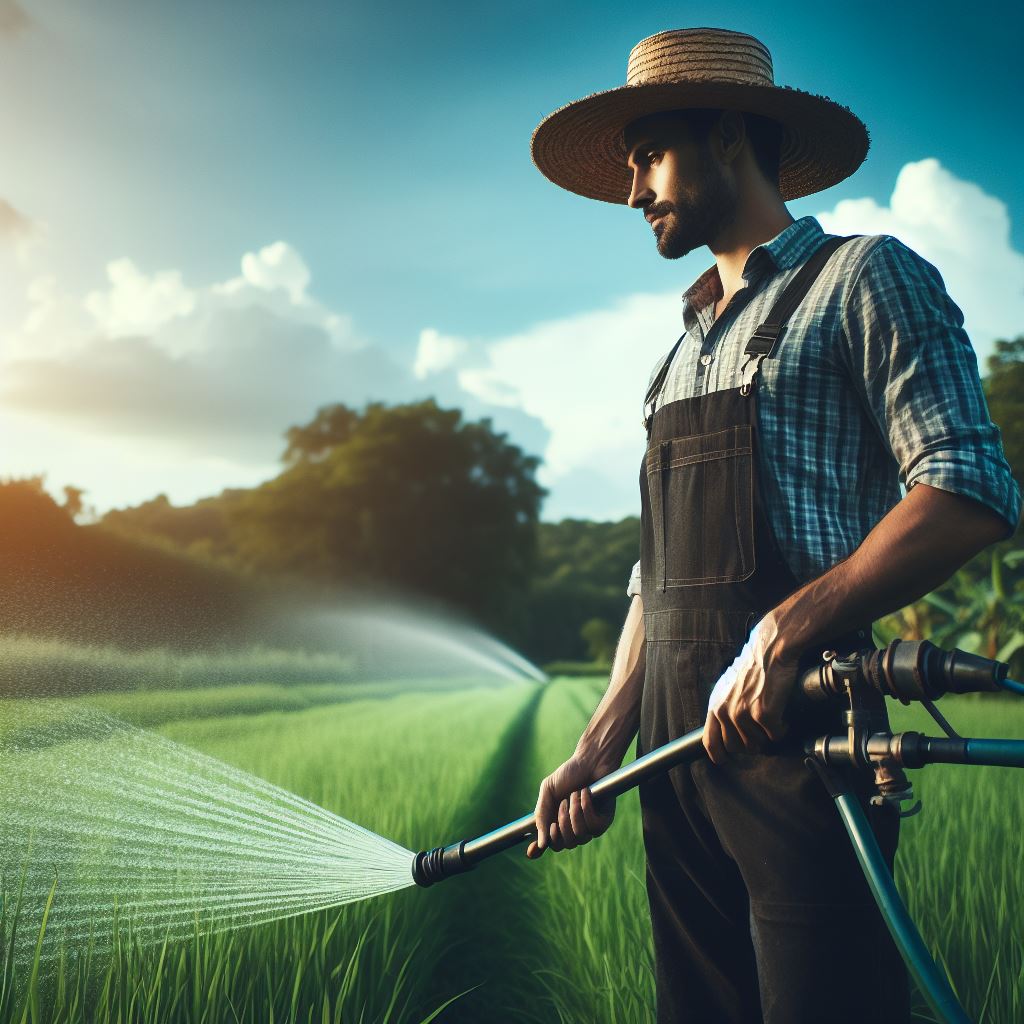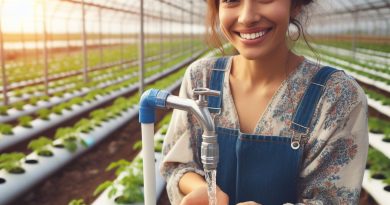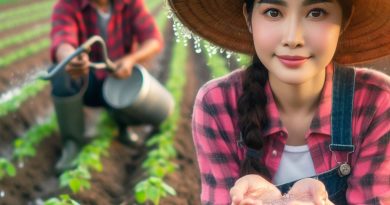Sustainable Water Use in Farms
Last Updated on March 2, 2024
Introduction
Sustainable water use in farms is crucial for the long-term viability of agriculture. Farms heavily rely on water for irrigation, livestock, and crop production.
However, water scarcity and increasing demands pose significant challenges for sustainable water management in farming practices.
Importance of sustainable water use in farms
Sustainable water use in farms is vital for preserving water resources and ensuring food security. Implementing efficient irrigation techniques reduces water waste and conserves this precious resource.
By managing water sustainably, farmers can minimize negative environmental impacts, such as soil erosion and water pollution.
Overview of the topic
The topic of sustainable water use in farms encompasses various aspects. It involves promoting water-saving technologies, adopting efficient irrigation methods, and encouraging responsible water management practices.
Additionally, it emphasizes the need for proper monitoring and control of water usage to ensure its effective utilization.
Successful implementation of sustainable water use in farms requires collaboration among farmers, policymakers, and researchers.
Together, they can develop innovative strategies to optimize water use, enhance crop productivity, and reduce environmental impact. Moreover, promoting awareness among farmers about the importance of sustainable water management is crucial.
Basically, sustainable water use in farms is necessary to meet the challenges posed by water scarcity and increasing demands. By prioritizing water conservation, farmers can secure their livelihoods, protect the environment, and contribute to global food security.
Implementing sustainable water management practices is not only a responsibility but also an opportunity for the agricultural sector to thrive in a world with limited water resources.
Definition of sustainable water use in farms
Explanation of sustainable water use
Sustainable water use in farms is the practice of utilizing water resources efficiently and responsibly in agricultural activities. It involves minimizing water wastage and maximizing water productivity.
Sustainable water use entails employing innovative techniques, such as drip irrigation and precision farming, to minimize water loss. It also involves employing water-saving technologies to optimize water usage.
By implementing sustainable water use practices, farms can reduce the overall demand for water, which helps conserve this precious resource. It also leads to increased farm productivity and profitability.
Application of sustainable water use practices in farming
Several practices can be utilized to achieve sustainable water use in farming:
- Implementing efficient irrigation techniques: By using methods like drip irrigation or sprinklers, farmers can provide water directly to plants’ roots, significantly reducing water wastage.
- Planning irrigation schedules: By scheduling irrigation based on crop needs and weather conditions, farmers can avoid over-watering and prevent water loss through evaporation.
- Collecting and reusing rainwater: Installing rainwater harvesting systems allows farmers to capture and store rainwater for irrigation purposes, reducing reliance on freshwater sources.
- Adopting precision farming techniques: Using sensors, drones, and other technologies, farmers can precisely monitor soil moisture levels, allowing them to apply water only where necessary.
- Managing soil health: Implementing practices like cover cropping and conservation tillage helps improve soil structure, allowing it to better retain water and reduce runoff.
- Employing crop rotation and diversification: Growing different crops in rotation or planting drought-tolerant varieties can help mitigate water usage by allowing farmers to adapt to changing water availability.
- Investing in efficient water infrastructure: Upgrading outdated irrigation systems or investing in technologies that monitor and control water usage can help reduce water waste significantly.
- Adopting agroforestry practices: Planting trees and establishing windbreaks not only helps conserve water by reducing evaporation but also improves soil moisture retention and biodiversity.
- Considering local climate and hydrological conditions: Understanding the local climate and water availability is crucial in selecting appropriate crops and irrigation strategies to avoid water stress.
- Educating and raising awareness: Providing farmers with training and information about sustainable water use practices can lead to widespread adoption and long-term benefits.
In summary, sustainable water use in farms involves efficiently managing and conserving water resources in agricultural activities.
By implementing various practices like efficient irrigation techniques, soil management, and adopting precision farming, farmers can maximize water productivity, reduce water waste, and ensure the long-term sustainability of water resources.
Embracing sustainable water use is essential for the viability of farming and for preserving this vital resource for future generations.
Read: Best Times to Harvest Corn: Key Tips & Tricks
The current challenges of water use in farms
High water consumption in traditional farming methods
Traditional farming practices often involve inefficient irrigation techniques, leading to excessive water usage.
Chemical contamination of water sources
The use of chemical fertilizers and pesticides in farming can result in water pollution, affecting both human health and ecosystems.
Depletion of groundwater resources
Over-extraction of groundwater for farming purposes can lead to a decline in water levels and the drying up of wells, causing water scarcity.
Sustainable water management strategies
To address these challenges, farmers and policymakers can implement sustainable water management strategies:
- Adopting efficient irrigation techniques: Farmers can switch from traditional flood irrigation to modern methods like drip irrigation, which significantly reduces water wastage.
- Implementing precision agriculture: Utilizing advanced technologies, such as sensors and drones, can enable farmers to monitor soil moisture levels and deliver water precisely where it is needed, minimizing water consumption.
- Promoting organic farming practices: Reducing dependency on chemical inputs and transitioning to organic farming methods can prevent water contamination and promote healthy ecosystems.
- Emphasizing water recycling and reuse: Treating and reusing wastewater from agricultural activities can help reduce freshwater demand and minimize pollution of water bodies.
- Implementing crop rotation and cover cropping: By rotating crops and using cover crops, farmers can improve soil health, retain moisture, and reduce the need for excess water and chemical inputs.
- Encouraging agroforestry: Planting trees and creating agroforestry systems can enhance water retention in the soil, mitigate erosion, and provide multiple benefits for agriculture and the environment.
- Monitoring and regulating water usage: Governments and regulatory bodies should establish robust monitoring systems to track water consumption in farms and enforce water use regulations.
- Investing in research and innovation: Continued research and development in water-efficient technologies and farming practices can drive further advancements in sustainable water use in agriculture.
By embracing these solutions, we can overcome the challenges of water use in farms and move towards a more sustainable and resilient agricultural sector.
Read: Crop Diversity Benefits Revealed
Benefits of Sustainable Water Use in Farms
Conservation of water resources
- Utilizing sustainable water practices ensures the preservation of limited water resources.
- By minimizing water wastage, farms contribute significantly to the conservation of valuable freshwater sources.
- Implementing efficient irrigation methods and water management techniques reduces the strain on local water supplies.
Reduction in water costs for farmers
- Sustainable water use helps farmers lower their water bills by utilizing resources more effectively.
- By adopting smart farming techniques, such as drip irrigation, farmers can optimize water usage and minimize expenses.
- Saving water also means reducing energy costs associated with pumping and treating water on farms.
Preservation of ecosystem balance
- Sustainable water practices prevent excessive extraction, maintaining a healthy balance in aquatic ecosystems.
- By preserving natural water sources and reducing pollution, farms positively impact local aquatic flora and fauna.
- Protecting water ecosystems through sustainable practices contributes to biodiversity conservation and overall ecosystem health.
Improved crop quality and yield
- Adequate and sustainable water supply enhances crop growth and development.
- Proper irrigation techniques ensure optimal moisture levels, which promote healthier plants, reducing diseases and pests.
- Consistent access to water also leads to improved crop yields, supporting food security and economic stability in agricultural communities.
With the numerous benefits of sustainable water use in farms, it is crucial for farmers to adopt these practices. Conservation of water resources ensures the availability of this vital resource for future generations while also addressing challenges in the agricultural sector.
By making conscious efforts to minimize water wastage, farmers actively contribute to the preservation of limited freshwater sources.
Implementing efficient irrigation systems, such as drip irrigation or precision sprinklers, can significantly reduce water usage without compromising crop quality.
Reducing water costs is another advantage of sustainable water use. By optimizing water usage, farmers can lower their expenses, saving both water and money.
These cost savings can then be redirected towards other farm operations or investments, enhancing overall farm profitability.
Sustainable water practices also play a vital role in preserving the delicate balance of ecosystems. Excessive extraction of water and pollution can disrupt aquatic habitats, affecting biodiversity and endangering species.
By reducing their water footprint and preventing pollution runoff, farmers contribute to the protection and preservation of natural ecosystems.
Furthermore, sustainable water use positively impacts crop quality and yield. Adequate water supply and effective irrigation management ensure optimal moisture levels for plants, promoting healthy growth and minimizing vulnerability to diseases and pests.
With improved crop health, farmers can achieve higher yields, enhancing food production and supporting food security for communities.
In short, sustainable water use in farms brings numerous benefits. By conserving water resources, farmers contribute to the preservation of limited freshwater sources.
This, in turn, reduces water costs and helps maintain a healthy ecosystem balance. Moreover, by improving crop quality and yield, sustainable water practices support food security and economic stability in agricultural communities.
It is essential for farmers to adopt these practices to ensure a sustainable and prosperous future for agriculture.
Read: Improving Soil: Natural Methods
Strategies for sustainable water use in farms
By adopting these strategies, farmers can ensure sustainable water use in their operations while maintaining productivity and reducing environmental impacts.
Adoption of efficient irrigation techniques
One of the key strategies for sustainable water use in farms is the adoption of efficient irrigation techniques. This involves the use of advanced technologies and methods to minimize water wastage and maximize water efficiency.
Rainwater harvesting and storage
Rainwater harvesting and storage is another effective strategy for sustainable water use in farms. This involves collecting and storing rainwater for later use in irrigation, reducing the reliance on freshwater sources.
Rainwater harvesting and storage systems can capture and store rainwater for later use. This can be achieved through techniques like rooftop collection, underground tanks, and pond reservoirs.
By utilizing rainwater during dry spells, farmers can reduce their dependence on groundwater and surface water sources, preserving these valuable resources.
Crop selection and rotation for water efficiency
Selecting and rotating crops based on their water requirements can significantly improve water efficiency in farms. Choosing drought-tolerant crops and implementing crop rotation practices can help conserve water resources.
Crop selection and rotation play a crucial role in optimizing water use on farms. Farmers need to consider the water requirements of different crops and choose those that are better suited to the local climate and soil conditions.
Additionally, implementing crop rotation practices can help break pest and disease cycles, reducing the need for water-intensive treatments.
Use of organic and sustainable farming practices:
The use of organic and sustainable farming practices is essential for sustainable water use in farms. These practices minimize the use of chemical fertilizers and pesticides, reducing water pollution and protecting water sources.
Organic and sustainable farming practices are vital for minimizing water pollution and protecting water sources. These practices promote natural soil fertility, reducing the need for synthetic fertilizers that can leach into water bodies.
By avoiding chemical pesticides, organic farming also helps maintain water quality, preserving aquatic ecosystems.
In a nutshell, sustainable water use in farms is crucial for the long-term viability of agriculture and the preservation of water resources.
By adopting efficient irrigation techniques, utilizing rainwater harvesting, selecting appropriate crops, and practicing organic farming, farmers can contribute to water conservation and protect the environment.
Read: No-Till Farming: Pros & Cons

Successful Examples of Sustainable Water Use in Farms
- Farm Fresh Organics, located in California, utilizes drip irrigation and rainwater harvesting to minimize water waste.
- Riverbend Ranch in Texas has implemented a system of water-efficient sprinklers and precision irrigation technology.
- Green Acres Farm in Australia employs a combination of soil moisture sensors and variable rate irrigation to optimize water use.
- Happy Harvest Farm in Oregon employs crop rotation and cover crops to reduce water needs and prevent soil erosion.
- Sunny Fields Farm in Vermont has implemented a constructed wetland to naturally filter and recycle water used in farming operations.
Case Studies of Farms Implementing Sustainable Water Use Practices
- Northwest Orchards in Washington increased water efficiency by installing low-pressure overhead irrigation and using moisture sensors.
- Mountain Valley Farm in Colorado improved water use by implementing a closed-loop recycling system for irrigation water.
- Golden Grain Orchards in Oregon reduced water consumption by transitioning to micro-sprinkler systems and practicing deficit irrigation.
- Southern Vineyards in California effectively manages water use through the use of soil moisture probes and regulated deficit irrigation.
- Midwest Dairy Farm in Iowa implemented precision irrigation systems to reduce water waste, resulting in significant cost savings.
Positive Outcomes and Lessons Learned
- Increased crop yield: Farms that have adopted sustainable water use practices report higher crop yields due to efficient irrigation and optimized water usage.
- Water conservation: Sustainable water use practices minimize water waste, reducing the strain on local water sources and improving availability for other uses.
- Environmental benefits: Farms implementing sustainable water use practices contribute to water conservation, preserve soil quality, and protect ecosystems.
- Cost savings: Efficient water use lowers farmers’ water bills and reduces the need for expensive water infrastructure upgrades.
- Scalability and replicability: Successful examples and case studies provide valuable insights and guidance for other farms to implement sustainable water use practices.
Lessons learned from these successful farms include
Adopting technology-driven solutions like moisture sensors and precision irrigation systems can significantly improve water use efficiency.
Investing in infrastructure like rainwater harvesting systems and constructed wetlands can help reduce reliance on municipal water sources.
Crop rotation, cover crops, and deficit irrigation techniques play a crucial role in reducing water needs and improving soil health.
Collaboration among farmers, researchers, and agricultural extension services is crucial in sharing knowledge and best practices for sustainable water use.
Continuous monitoring and evaluation of water usage, combined with regular adjustments and improvements, foster ongoing improvement in sustainable water use on farms.
All in all, successful examples and case studies of sustainable water use in farms offer valuable insights into implementing efficient irrigation systems, reducing water waste, and improving crop yield.
These practices not only benefit farmers but also contribute to water conservation, environmental protection, and cost savings.
By learning from these experiences and applying lessons learned, farms can play a vital role in ensuring sustainable water use in agricultural practices.
Government regulations and incentives for sustainable water use in farms
Overview of relevant policies and regulations
Government regulations and incentives play a crucial role in promoting sustainable water use in farms. These policies and regulations aim to ensure responsible water management and encourage farmers to adopt sustainable practices.
By providing incentives, the government incentivizes farmers to use water efficiently and reduce wastage.
One of the main components of government regulations is the establishment of water use standards for farms. These standards set limits on the amount of water that can be used for irrigation, livestock, and other farm activities.
By implementing these regulations, the government ensures that water resources are not depleted or polluted.
In addition to water use standards, the government also implements various policies to promote sustainable water practices. For example, they may require farmers to use drip irrigation or other water-efficient technologies.
These techniques help minimize water loss through evaporation or runoff, resulting in significant water savings.
Incentives provided to encourage farmers towards sustainable water use
Furthermore, the government may provide financial incentives to encourage farmers to adopt sustainable water practices. These incentives can take the form of grants, subsidies, or tax breaks.
By offering financial support, the government reduces the financial burden on farmers who want to invest in water-efficient infrastructure or equipment.
Another incentive provided by the government is technical assistance and education. They may offer workshops, training programs, or informational materials to educate farmers about sustainable water use techniques.
By providing access to information and technical support, the government empowers farmers to make informed decisions regarding water management.
In addition to government regulations and incentives, there are also voluntary programs and partnerships that aim to promote sustainable water use in farms.
These programs often involve collaboration between government agencies, agricultural organizations, and farmers themselves. They provide a platform for knowledge exchange, best practices sharing, and collective action towards water sustainability.
Some of these voluntary programs focus on water conservation and efficiency, while others target water quality improvement and pollution prevention.
Regardless of their specific goals, these initiatives contribute to a more sustainable agricultural sector by promoting responsible water practices.
Generally, government regulations and incentives are essential for promoting sustainable water use in farms. They provide the necessary framework and support for farmers to adopt water-efficient practices.
By setting standards, offering incentives, and providing education, the government plays a vital role in ensuring the responsible use of water resources in agriculture.
These efforts not only benefit farmers but also contribute to the overall sustainability of the agricultural sector and the environment.
Delve into the Subject: Maximizing Small-Scale Farming
Challenges and Limitations of Sustainable Water Use in Farms
Initial costs and investments required
Implementing sustainable water use practices in farms involves significant upfront investments. These include installing efficient irrigation systems, rainwater harvesting infrastructure, and water storage tanks.
Adoption and implementation barriers
Lack of awareness and knowledge about sustainable water use practices can hinder their adoption in farms. Resistance to change and reluctance to invest in new technologies can also be barriers.
Need for education and awareness
Farmers need to be educated about the benefits of sustainable water use and the potential savings in water and energy costs. Increased awareness can encourage the adoption of these practices.
Water scarcity and availability
In areas prone to water scarcity, farmers may face limitations in accessing sufficient water for agricultural activities. Climate change can have adverse effects on water availability, further exacerbating the problem.
Technical expertise and assistance
Farmers may require technical expertise to implement sustainable water use practices effectively. Access to consultants, experts, and support systems can help address challenges associated with implementation.
Infrastructure and technology limitations
Limited access to infrastructure required for sustainable practices, such as drip irrigation systems or efficient pumps, can pose challenges to farmers. The availability of affordable and suitable technology is crucial.
Regulatory and policy framework
A supportive policy environment is essential for the successful adoption of sustainable water use practices. Clear regulations, incentives, and subsidies can encourage farmers to invest in these practices.
Long-term sustainability
Sustaining the benefits of efficient water use in farms requires continuous monitoring, maintenance, and upgrading of systems. Lapses in these activities can compromise the effectiveness of sustainable water use.
Water quality concerns
Using water from polluted sources can have detrimental effects on crop yield and human health. Farmers need to ensure access to clean and safe water for irrigation purposes.
Changing weather patterns
Unpredictable and extreme weather events can disrupt water supply systems and impact farm productivity. Farmers must adapt their water management strategies to cope with changing climate conditions.
Economic viability
Determining the economic viability of sustainable water use practices is crucial. Farmers need to assess the costs and benefits, including the potential savings in water and energy,
to make informed decisions.
Scale and size of farms
The challenges associated with sustainable water use may vary depending on the size and scale of the farm. Larger farms may require more extensive infrastructure and face higher implementation costs.
Behavior and mindset shift
Changing traditional farming practices and adopting sustainable water use requires a shift in behavior and mindset. Farmers need to be open to new ideas and willing to embrace change for long-term benefits.
Collaboration and collective action
Addressing the challenges of sustainable water use in farms requires collaboration among farmers, government agencies, NGOs, and researchers. Collective action can lead to shared knowledge and resources.
In essence, sustainable water use in farms is not without its challenges and limitations.
However, by addressing initial costs, adoption barriers, and education gaps, and fostering a supportive policy environment, we can overcome these challenges and ensure the long-term viability of our agricultural practices.
Collaborative efforts and continuous innovation are key to achieving sustainable water use in farms
Explore Further: Chemical Control: Is It Safe for Crops?
Conclusion
Recap of the importance of sustainable water use in farms
Sustainable water use in farms is crucial for the preservation of our water resources and the long-term viability of agriculture.
Throughout this blog section, we have highlighted the importance of sustainable water practices in farms and the benefits they bring.
By implementing water-efficient irrigation systems, reducing water waste, and adopting conservation measures, farmers can ensure that water is used responsibly.
It is essential for farmers to prioritize sustainable water use in their farming practices to protect the environment, enhance crop yields, and optimize resource allocation.
Call to action for farmers to prioritize sustainable practices
We urge farmers to embrace sustainable practices, such as precision irrigation, soil moisture monitoring, and crop rotation, to minimize water consumption and reduce the risk of water scarcity.
Future prospects for sustainable water use in farming
Looking ahead, the future prospects for sustainable water use in farming are promising.
Advancements in technology, such as remote sensing and data analytics, can further enhance water management practices on farms.
Additionally, there is growing awareness and support for sustainable agriculture, leading to increased funding and research in this field.
With continued collaboration between farmers, researchers, and policymakers, we can achieve a more sustainable and efficient use of water in agriculture.
By embracing sustainable water practices, farmers can contribute to a healthier ecosystem, improved food security, and a more sustainable future.


